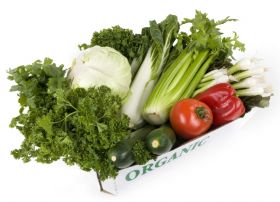Organic Food
Research conducted in US claims to show that switching to an organic diet could improve sperm quality and quantity
Pesticides on fruit and veg could be harming sperm counts, new research has suggested.
The team from Harvard University in the USA suggested that men should consider going organic if they want to have children, as, although their research wasn’t conclusive, they believe produce containing high levels of pesticides may be having a damaging impact on semen quality and quantity.

The study found that men who ate at least one and half portions of fruit and vegetables containing high levels of pesticide residue had sperm counts which were 49% lower than usual. Their semen quality was also reduced by 32%.
Those who ate large quantities of fruit and vegetables with little or no residue saw their sperm quality increase by 37%.
The researchers stated: “These findings should not discourage the consumption of fruit and vegetables in general. In fact, we found that total intake of fruit and vegetables was completely unrelated to semen quality.
The team analysed 338 semen samples from 155 men aged between 18 and 55 attending a fertility centre between 2007 and 2012.
The men’s diet was assessed by a questionnaire, and they were asked how often, on average, they had consumed how many portions of fruit and vegetables, using standard portion sizes such as one apple, or half an avocado.
The study took account of usual practice in food preparation, such as whether the fruit and vegetables had been peeled and washed.
The researchers divided the men into four groups, ranging from those who ate the greatest amount of fruit and vegetables high in pesticides residue (1.5 servings or more a day), to those who ate the least amount (less than half a serving a day).
They also looked at men who ate fruit and vegetables with low-to-moderate pesticide residues.
The group of men with the highest intake of pesticide-heavy fruit and vegetables had an average total sperm count of 86 million sperm per ejaculate compared to men eating the least, who had an average of 171 million sperm per ejaculate – a 49% reduction.
The research was published in the journal Human Reproduction.
Switching from regular to organic produce could give same benefits as adding one or two portions to your current 5 A DAY intake

Organic food contains more of the antioxidant compounds linked to better health and lower levels of toxic metals and pesticides, according to a new study. The international team behind the study suggest that switching from regular to organic fruit and vegetables could give the same benefits as adding one or two portions of the 5 A DAY currently recommended, The Guardian reports.
The news outlet reported that the team, led by Professor Carlo Leifert at the University of Newcastle, found that there are “statistically significant, meaningful” differences between organic and regular produce, with a range of antioxidants being “substantially higher” – between 19% and 69% – in organic food.
It is believed to be the first study to demonstrate clear and wide-ranging differences between organic and conventional fruits, vegetables and cereals.
The researchers say the increased levels of antioxidants are equivalent to “one to two of the five portions of fruits and vegetables recommended to be consumed daily, and would therefore be significant and meaningful in terms of human nutrition, if information linking these [compounds] to the health benefits associated with increased fruit, vegetable and whole grain consumption is confirmed.”
However, Tom Sanders, a professor of nutrition at King’s College London, told The Guardian that while the research did show some differences, “the question is are they within natural variation? And are they nutritionally relevant? I am not convinced.”
He added that Leifert’s work had caused controversy in the past.
The results are based on an analysis of a record-breaking 343 previously peer-reviewed studies from all over the world which examine differences between organic and conventional fruit, vegetables and cereals.
The research is due to be published in the British Journal of Nutrition next week. It has, however, appeared on numerous medical sites this week.